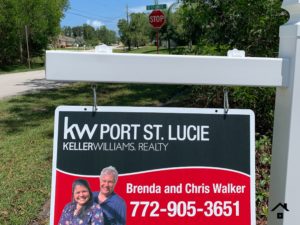What are the typical seller closing costs and fees will you run into when selling your home? What are the costs involved when selling? How much should I expect?
These are common questions sellers ask us when we sit down to talk about listing your home for sale.
We are real estate agents in Port St Lucie, Florida and serve the three counties of Indian River, St. Lucie, and Martin County. Let us tell you about the common expenses you’ll encounter when you list your home with great real estate agents.
Customary and usual expenses may vary in other places.
What is Preprinted in the AS-IS contract in FL
When you receive an offer to purchase your home, it will likely be on the Florida As-IS Contract (ver. 6x).
The Florida As-IS contract has a preprinted section (9c) that reads:
TITLE EVIDENCE AND INSURANCE: At least __ (if left blank, then 15, or if Paragraph 8(a) is checked, then 5) days prior to Closing Date (“Title Evidence Deadline”), a title insurance commitment issued by a Florida licensed title insurer, with legible copies of instruments listed as exceptions attached thereto (“Title Commitment”) and, after Closing, an owner’s policy of title insurance (see STANDARD A for terms) shall be obtained and delivered to Buyer. If Seller has an owner’s policy of title insurance covering the Real Property, Seller shall furnish a copy to Buyer and Closing Agent within 5 days after the Effective Date. The owner’s title policy premium, title search and closing services (collectively, “Owner’s Policy and Charges”) shall be paid, as set forth below. The title insurance premium charges for the owner’s policy and any lender’s policy will be calculated and allocated in accordance with Florida law, but may be reported differently on certain federally mandated closing disclosures and other closing documents. For purposes of this Contract “municipal lien search” means a search of records necessary for the owner’s policy of title insurance to be issued without exception for unrecorded 165 liens imposed pursuant to Chapters 153, 159 or 170, F.S., in favor of any governmental body, authority or agency.
(CHECK ONE):
- (i) Seller shall designate Closing Agent and pay for Owner’s Policy and Charges, and Buyer shall pay the premium for Buyer’s lender’s policy and charges for closing services related to the lender’s policy, endorsements and loan closing, which amounts shall be paid by Buyer to Closing Agent or such other provider(s) as Buyer may select; or
- (ii) Buyer shall designate Closing Agent and pay for Owner’s Policy and Charges and charges for closing 172 services related to Buyer’s lender’s policy, endorsements and loan closing;
- (iii) is particular to Miami-Dade County.
The offer to purchase will come with a choice of who designates the closing agent and the customary practice of who pays particular fees
COSTS TO BE PAID BY SELLER
- Documentary stamp taxes and surtax on deed, if any
- Charges for FIRPTA withholding and reporting
- HOA/Condominium Association estoppel fees
- Recording and other fees needed to cure title
- Seller’s attorneys’ fees
If the seller designates the closing agent
- Owner’s Policy and Charges
- Municipal lien search
If the buyer designates the closing agent
- Owner’s Policy and Charges
- Municipal lien search
When You Meet with Us at the Listing Appointment
When you meet with us, we will present a spreadsheet we call the Seller’s Net Sheet. It shows 3 different price points and the related fees that might be involved in your transaction.
In these spreadsheets, we provide the example as if the seller has designated the closing agent AND you are choosing to use the recommended title company whose fee schedule is programmed into our sheet.
If you are choosing a different closing agent in the transaction, those fees will change. For the net sheet, we have to pick one to discuss the fees you might encounter.
Sales Commission
The first closing fee is the sales commission. You hire a real estate agent to handle the sale of your house and there will be a sales commission involved. It is negotiable between the listing agent and you. This fee is agreed to at the beginning of the listing and is printed on the listing agreement. It is not part of the discussion when you receive an offer to purchase.
Brokerage Fee
Our brokerage charges a fee as additional compensation. That will be on your seller net sheet and documented in the listing agreement. This fee is agreed to at the beginning of the listing and is printed on the listing agreement. It is not part of the discussion when you receive an offer to purchase.
Seller Concessions
When you receive an offer to purchase your home, the buyer may ask for some seller concessions. This is money that you are giving them from your equity to assist them with closing costs, points, and pre-paids.
Not every offer will come with a request for seller concessions. A popular seller concession is a percentage amount to buy down the buyer’s interest rate. We have seen requests for .5% of the purchase price up to 3% of the purchase price.
Oftentimes, the offer of seller concessions may be better than a price reduction of the same amount. It is a benefit to the buyer.
We do not put seller concessions on your net sheet because they may or may not come up in the offer to purchase.
Title Insurance Premium
Title insurance is a specialized form of insurance that safeguards homeowners and landowners from potential financial losses associated with defects in the title of the property. The title encompasses ownership rights, and any issues, such as undisclosed heirs, unresolved liens, or errors in public records, can jeopardize an owner’s claim to the property.
When you bought your property, you got a title insurance policy. You might have paid for it in your closing costs, or your seller might have paid for it.
Different regions around the country have different customs as to who pays the title insurance premium. In St Lucie County, the customary practice is the one who picks the title company is the one who pays for the title insurance premium. That’s pre-printed in the Florida As-Is Contract. It’s the item labeled “Owner’s Policy and Charges.”
If the buyer chooses the title company, the buyer pays this premium. If the seller chooses the title company, the seller pays the title insurance premium.
During the negotiation process on the offer to purchase your property, you can settle the choice of who pays the title insurance premium.
The amount of the title insurance premium is calculated based on the sales price of the house or vacant lot.
The amount is not negotiable. The only negotiation point here is who pays.

Documentary Stamps
In the Florida AS-IS offer to purchase that you likely will receive, home sellers will pay the documentary stamps at closing. You might consider this a sales tax or a departure tax.
Documentary stamp tax is levied on deeds and other documents as provided under Chapter 201, Florida Statutes (F.S.).
It is based on the sale price of the house. The tax rate for documents that transfer an interest in real property is $.70 per $100 (or portion thereof) of the total consideration paid, or to be paid, for the transfer.
An exception is Miami-Dade County, where the rate is $.60 per $100 (or a portion thereof) when the property is a single-family residence. If the Miami-Dade property is anything other than a single-family residence, the tax rate is $.60 plus $.45 surtax per $100 (or a portion thereof).
Your buyer will pay documentary stamps on any mortgage or liens they take out on the home.
Satisfaction of Mortgage
If you have a mortgage on the property you are selling, it will be paid off at closing. Each mortgage will have a “satisfaction of mortgage” recorded in the public record.
Right now, that fee is just under $20.00 per mortgage.
Proration of Real Estate Property Taxes
The title company will calculate the amount of real estate taxes you are responsible for up to the day of closing. Property taxes are paid in arrears. This means you pay the taxes for the days behind you. You will have a proration to cover the number of days you have owned the property since the last bill was paid.
If you paid your bill on December 1, and your closing is January 15, you’ll have a proration for the 30 days in December, and the 15 days of January that you have owned the property.
Title Fees
Title companies charge a buyer and a seller a basic fee for their services, plus some related fees to remote notaries, document storage, express mail if needed, filing fees, municipal lien searches, and other third-party service fees.
These fees vary based on your situation and the title company involved.
When we present our customers with a net sheet, we calculate what you would pay if you use the title company we recommend.
Some sellers may choose to have an attorney review their documents at an additional charge. A few title companies provide this service as part of their regular fee to sellers.
If you are selling a home in a homeowners association, you’ll have an Estoppel fee included on this line. An estoppel document notifies the title company that you have settled all obligations (such as property condition and HOA fees) with the Homeowner’s Association.
You may have to have corrective title documents prepared and recorded. We’ve seen this happen in cases where quit claim deeds from one family member to another were done incorrectly.
These fees are not negotiable. They are fixed costs as charged by the title company and, if included, the Home Owners Association.
If you are choosing a title company, you have the liberty to shop around and choose one to your liking.
Estimating Fees When Selling Your Home
A simple rule of thumb – closing costs can be about 2.5% of your transaction, plus whatever brokerage commissions you’ve agreed to pay in the listing when you choose the closing agent. This article assumes a normal real estate agent-assisted transaction.
There are so many costs that depend on the final sale price, proration of taxes, and choice of title company.
When you hire us to list your house, we’ll prepare a net sheet for you that is based on you choosing the closing agent that we recommend. We’ll use this as a conversation point to give you a good estimate of the amount of proceeds you’ll have.
We want to be your choice of real estate agents in Port St Lucie. When you book a call with us about listing your home, we will set up a time to go over this with you in detail.



